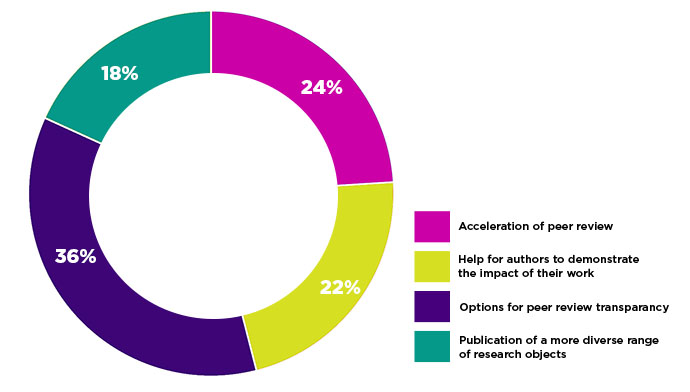Since September 2023, cOAlition S, in partnership with Jisc and PLOS, have been working with a multi-stakeholder working group to identify business…
Published Peer Review (community comments)
In February, we asked researchers about the biggest change they hope to see in Open Science. Nearly 3,000 of you weighed in. Here’s what you had to say…
In May, we introduced published peer review history at PLOS, a modular approach to transparent peer review that invites to you choose the model that works best for you and your particular manuscript. Reviewers decide whether to sign their comments at submission. Accepted authors decide whether to publish peer review history alongside their manuscript. The whole community benefits from a deeper more nuanced view of the peer review process.
What is the community saying about peer review history
 “[with] transparency in peer review … the process becomes more fair and clear and, above all, the result of scientific production is more collaborative and effective.”
“[with] transparency in peer review … the process becomes more fair and clear and, above all, the result of scientific production is more collaborative and effective.”
– Leonardo A. Peyré-Tartaruga, Universidade Federal do Rio Grande do Sul, Porto Alegre, Brazil
 “I think signed peer review will help legitimize the peer review process as a scholarly output instead of a service commitment. It will also encourage researchers to participate in a more thoughtful process and can provide a valuable contribution to the study’s scientific record.”
“I think signed peer review will help legitimize the peer review process as a scholarly output instead of a service commitment. It will also encourage researchers to participate in a more thoughtful process and can provide a valuable contribution to the study’s scientific record.”
Carrie Dolan, William and Mary, Williamsburg, Virginia, United States of America
 “[open peer review] improves auditability of the article itself and the journal’s processes and thoroughness…It also helps build public trust in the process by removing the mystery of secret academic peer review, as well as showing the robustness of the method in action.”
“[open peer review] improves auditability of the article itself and the journal’s processes and thoroughness…It also helps build public trust in the process by removing the mystery of secret academic peer review, as well as showing the robustness of the method in action.”
– Thomas Shafee, La Trobe Institute for Molecular Science, La Trobe University, Melbourne, Australia
 “Peer review is more essential and relevant today as it has ever been. We are entering an era where there is limitless information with very limited means to understand it value. As a scientific community, we need to engage the public more often. A part to this is helping them understand the peer review process and how it leads to the discoveries of tomorrow.”
“Peer review is more essential and relevant today as it has ever been. We are entering an era where there is limitless information with very limited means to understand it value. As a scientific community, we need to engage the public more often. A part to this is helping them understand the peer review process and how it leads to the discoveries of tomorrow.”
Scott Pegan, University of Georgia, Athens, Georgia, United States of America
 “Transparency in peer review may develop the quality of research and reduce research misconduct. So everyone can see clearly on the how, what, and why behind the editorial decision making. This is about trust, and trust is one of the important things in the scholarly publication.”
“Transparency in peer review may develop the quality of research and reduce research misconduct. So everyone can see clearly on the how, what, and why behind the editorial decision making. This is about trust, and trust is one of the important things in the scholarly publication.”
– Monika Oktora, University of Groningen, University Medical Center Groningen (UMCG), Groningen, The Netherlands

